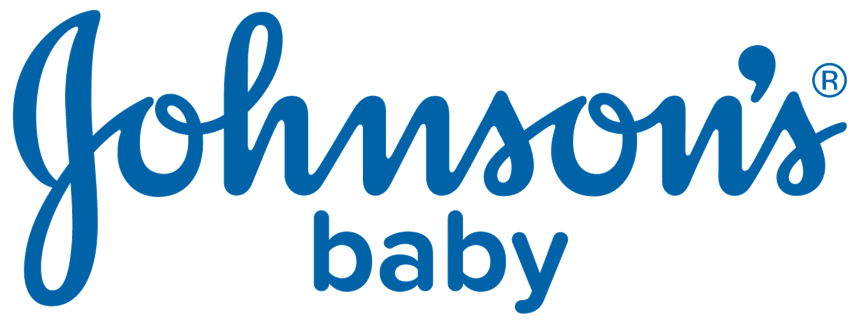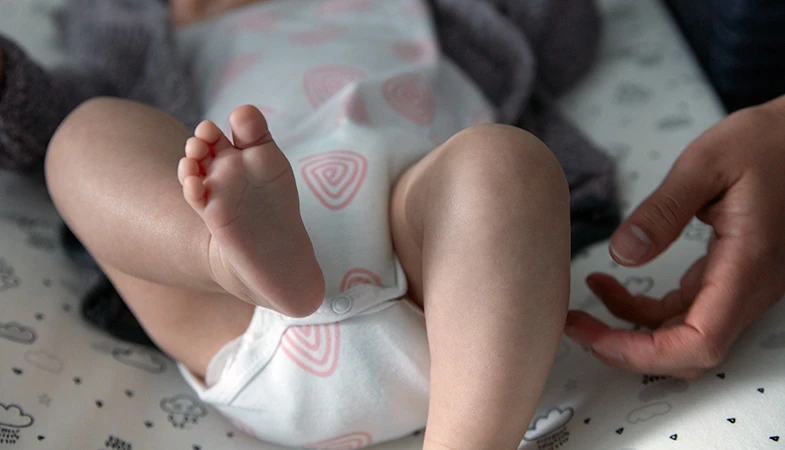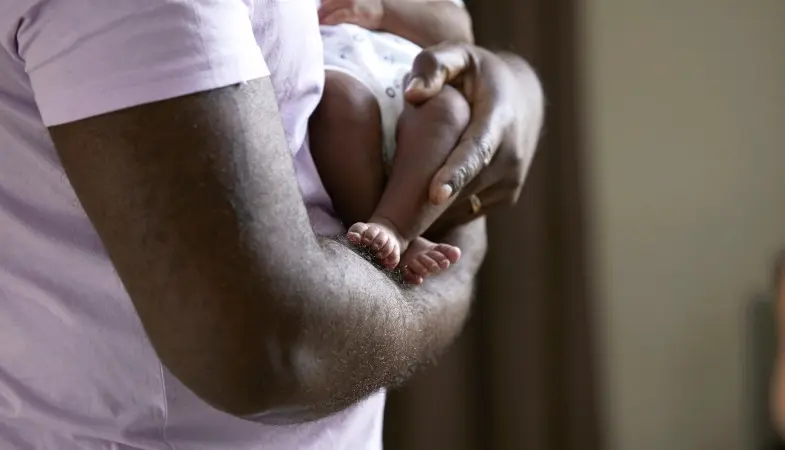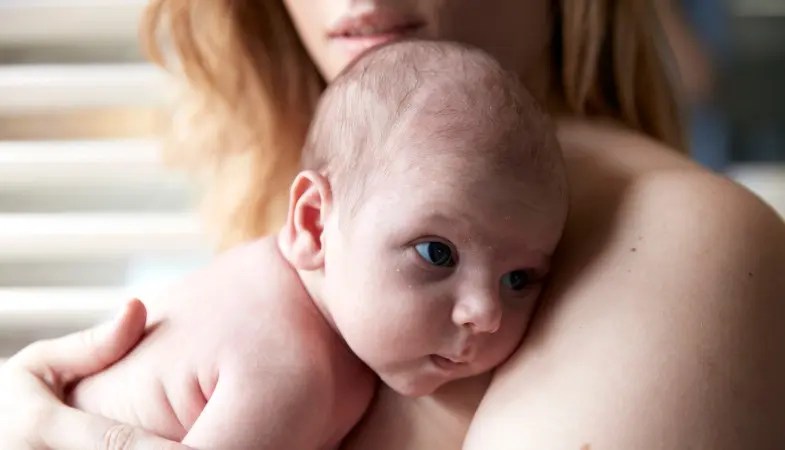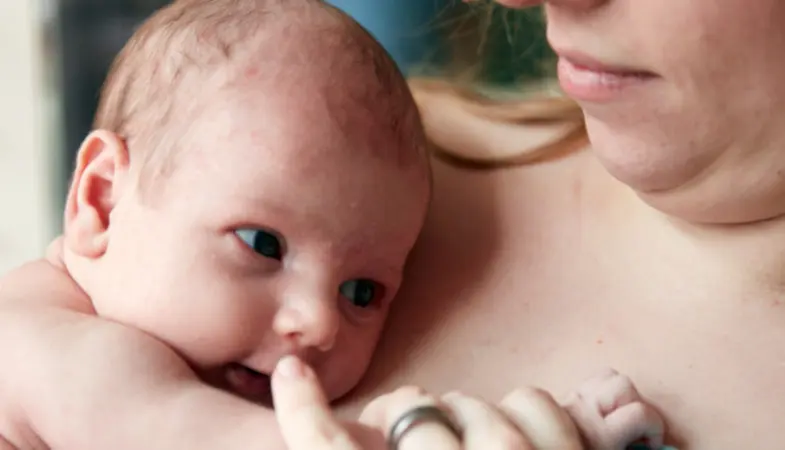Newborn baby essentials: Everything you need
You might feel like there is a lot to prepare when you have a baby on the way – but there’s nothing that a bit of planning and preparation can’t solve. Our handy guide will walk you through a list of baby essentials, from bath time and bedtime to feeding and fun times with your new arrival.
Of course, our list doesn’t cover everything . Every little one is different, but you can use it as your go-to newborn essentials guide as a busy parent preparing for the big day.
Newborn clothing essentials
There’s a lot to think about when buying clothes for your newborn. In those early years, practicality is key. With this in mind, here are some of the essentials you’ll need to tick off your list1:
All-in-one stretch suits for wear during the night and day.
Light wool or cotton cardigans .
Vests.
A shawl.
Wool or cotton socks, booties, hat, and mittens.
A sun hat.
Clothes storage for the nursery.
Of course, with a newborn comes new mess. Some parents like to buy gentle detergent when washing their baby's clothes. However, there isn't any evidence that bio washing powders will irritate your baby's skin1– so it’s up to you!
Baby bedtime essentials
While you may get excited about decorating and collecting all the must-have baby bedtime gadgets to prepare your nursery, the first thing you need to do is buy the essentials. To start, think about getting:
A crib. This is usually the top of the list of things you need for a new baby. Their crib, or cot, should be safe, secure, and sturdy. You should also make sure that it meets British safety standard BS EN 716.1
A portable bassinet or Moses basket. For the first few months, your baby might be best sleeping in something light and portable that you can easily move around, so they’re never too far away from you.1
A new mattress that snugly fits the cot and a waterproof cover. You should make sure that the mattress fits their cot exactly, so there aren’t any gaps they can fall into or get trapped in.1
Multiple sheets to cover the mattress. Your baby’s sheets will need to be changed regularly1, and you don’t want to be caught short! Ensure you get enough sheets, so you always have them available while others are in the wash.
Light blankets and bedding. Your baby needs to keep warm, but they’re only tiny, so you don’t want anything too heavy. Heavier bedding, including duvets and pillows, can make your baby too warm and aren’t safe to use until they’re around one year old.1
Baby monitor. Whether you opt for an audio-visual or just an audio baby monitor, these bits of tech are essential for keeping an eye on your little one while they sleep. You can choose from plenty of options, from two-way monitors to those with heat sensors and Wi-Fi capabilities.2
Baby feeding essentials
Alongside sleeping, your baby will be spending a lot of their time eating. You’ll need to find the right equipment to help keep them feeling full and happy. Some of the newborn baby feeding essentials include:
Breastmilk storage bags or bottles. If you decide you want to breastfeed, you’ll need somewhere to store your excess milk. This will also save you some hassle when it comes to feeding time.
Bottles and teats. There’s no such thing as a bottle or teat that’s ‘better’ than the rest3. However, you’ll want to stock up with a few basic bottles that are easy to clean3.
Bottle warmer. You’ll need a bottle warmer to heat your baby’s milk to kill bacteria found in formula powder4. Your baby will also prefer the milk if it’s a little warm, as it’s easier for them to digest4.
Bottle sterilising and cleaning equipment. You’ll need a few things to clean your baby’s bottles and teats, such as a steriliser.
Baby formula. There are many different types of formula to choose from, from first milk and hungry milk to anti-reflux and lactose-free5. Some babies may require specially prescribed formula if they’re allergic to normal formula or have a cow’s milk allergy3. If you have concerns, speak to your doctor.
Bibs and burp cloths. It’s normal for babies to burp and regurgitate a little bit of milk after you’ve fed them3. This is where bibs come in. You should have quite a few as well as any burp cloths to clean up any extra mess.
Feeding cushion and comfortable chair for feeding. Feeding cushions, or pillows, allow you and your baby to get comfortable. On average, for the first few months, you should feed a baby around six to nine times per day6 – so you’ll be spending quite a while in your chosen chair.
Breastfeeding pads and creams. If you breastfeed, you may need nursing pads. These absorb any milk that might leak out in between feedings. Breastfeeding creams can help heal your nipple skin from any discomfort caused by feeding, while also soothing cracks, soreness and itchiness7.
Baby bath essentials
Bathtime is often something most parents look forward to – mainly because it usually means bedtime is around the corner. It also allows you to spend some one-to-one playtime with your little one. Here are some of the baby bathroom essentials:
A soft, hooded towel. To keep your baby warm, dry, and cosy after their bath.
A soft brush and washcloth. Newborn babies’ skin is soft, thin and can be easily damaged8. Soft cloths and brushes make sure you don’t irritate it.
Special baby-formulated cleansers, oil, and moisturiser. Because your baby’s skin is so delicate, they need different skincare to adults9. You’ll need to pick up some cleansers, oils and moisturisers specially formulated for their skin9.
A baby bath. Of course, you can’t have bathtime without a bath. You can even use a washing up bowl for the first few months while they still fit.
Keep in mind that your baby doesn’t need a bath every day.10 On off-days, you might want to practise topping and tailing. This includes using cotton wool dipped in warm water to wash away the dirt on your baby’s face and neck, hands, and bottom.10
Nappy changing essentials
Changing your baby’s nappy can be quite a daunting task, though all it takes is a little practice and the right bits and pieces to get you started. You may feel like a novice at first, but you’ll be changing nappies and keeping baby happy like a pro after the first few weeks. Here are some items you should prioritise on your baby essentials changing list:
Changing table and mat. First, you’ll need somewhere to change your little one. If you can’t fit a changing table in your space, the next best thing is a changing mat, which can turn any surface into a baby changing station.
Nappies in the right size for your baby. It’s important to ensure the nappies you buy are the right size to fit your baby. It might take a few guesses and buying the wrong sizes before finding the perfect fit.
Nappy bin and liners. It’s good to dispose of used nappies and nappy waste in a separate bin or wrap them up securely in a liner if you’re putting them in your household waste bin. Make sure to try and flush as much of the contents away beforehand11.
Baby wipes or wet washcloths. Baby wipes or wet washcloths are great for a quick clean-up after changing your baby’s nappy. You should dispose of these with your nappies and make sure they’re fragrance- and alcohol-free12. You can also use warm cotton wool as an alternative12.
Barrier cream. Applying this after changing your baby’s nappy will help to protect their skin from irritation.
Baby playtime essentials checklist
It’s important to provide your baby with a safe and comfortable space to play and explore. A recent study by Infant Behaviour and Development also found that fewer toys lead to better playtime and enjoyment13 – so keeping it simple for your newborn may be the way to go. Let’s take a look at a few of the essentials:
A play mat and pen. Your baby needs somewhere comfortable to lay while they play. Nobody likes tripping over toys as soon as they walk through the door, so a pen is also helpful to keep everything in one place.
Simple toys with no small parts. Solid, simple toys mean there are no small detachable parts that babies can swallow. As your baby gets older and starts teething, some of these can be replaced with teething toys to soothe their sore gums14.
Colourful books to read to your baby. Reading to your little one, at any age, is important – even if they can’t quite understand you yet.
A baby swing or bouncer. Bouncers allow your baby to move in a safe way. This is especially useful as they start to roll and shuffle.
A baby mobile. A mobile can be hung above your baby’s play mat to keep them entertained while also relaxing them15, ready for bed.
Toy storage. You’ll need somewhere to put all your baby’s new things. Toy storage comes in all shapes and sizes. Some even opt for one with a cushioned lid, because every parent needs a good sit down at the end of the day.
Baby cleaning and healthcare checklist
Having a baby is exciting. You’ve got this whole new person ready to take on the world – but their health is always on your mind. Babies need a few extra things to help them live happily and healthily. This list of baby healthcare essentials may include:
First aid kit. For those everyday cuts and scrapes – for both parents and baby.
A humidifier. Central heating can cause the air in your home to become dry, potentially making your baby congested and drying out their skin16. A humidifier can help tackle this, so it’s especially useful if your baby is born in winter16.
Nasal aspirator. This handy device helps you suction out nasal mucus that may be obstructing your baby’s airways, so they can breathe clearly17.
Sunscreen. Y our baby’s skin is a little more delicate than yours9, so they need a high factor sunscreen and to wear protective clothing to ensure they don’t burn when out in the sunshine18. You should always make sure your chosen sunscreen has a three-to-five-star UV protection rating18.
Baby-friendly nail clippers or emery board. Baby’s nails grow fast19 and, if left uncut, they can lead to your baby scratching themselves. You may even need to maintain their nails up to twice a week19.
Baby gates, corner guards, and locks to baby-proof the house. Keeping your little one safe is the number one priority, so you may need to invest in some extra equipment around the house. Baby gates and locks keep them out of places they shouldn’t be, like the stairs and kitchen cabinets, while corner guards protect them from potentially nasty bumps on furniture.
Things you need for a baby when on the go
When you’re ready, it’s time to take your baby out and about. Stepping out with your new baby may be daunting at first, so you should make sure you have all the essentials ready. You’ll want to buy things like:
A pushchair with a strong frame and working breaks. These are only suitable for young babies if the seats are fully reclining.1
Baby carriers and slings. Your baby may prefer being carried this way, as it keeps them warm and means they’re close to you.1
Baby car seat and car sunshades. A car seat for your baby is a legal requirement and should be placed in a rear-facing position on the back seat.1 Sunshades on the windows are also helpful to protect their eyes from the sun while travelling in the car.
Nappy changing bag and portable changing mat. This is important for when you can’t just nip home to change your baby’s nappy. They really do wait for no one.
Breastfeeding cover for when feeding in public. You may be comfortable breastfeeding without a cover, but if you aren’t, this will provide you with some privacy when your little one is hungry.
1 https://www.nhs.uk/conditions/baby/caring-for-a-newborn/what-you-will-need-for-your-baby/ - (Page 1)
1 https://www.nhs.uk/conditions/baby/caring-for-a-newborn/what-you-will-need-for-your-baby/ - (Page 2)
2 https://www.pampers.co.uk/pregnancy/giving-birth/article/newborn-baby-checklist - (Page 2)
4 https://www.tommeetippee.com/en-gb/parent-room/heating-a-baby-bottle-the-right-way - (Page 1)
6https://www.healthline.com/health/parenting/baby-feeding-schedule#how-often-to-feed – (Page 3)
7https://www.healthline.com/health/breastfeeding/best-nipple-creams#Best-nipple-creams – (Page 2)
9https://www.johnsonsbaby.co.uk/skin-care/baby-skin - (Page 2)
10https://www.nhs.uk/conditions/baby/caring-for-a-newborn/washing-and-bathing-your-baby/ - (Page 1)
12https://www.nhs.uk/conditions/baby/caring-for-a-newborn/how-to-change-your-babys-nappy/ - (Page 1)
13https://www.sciencedirect.com/science/article/abs/pii/S0163638317301613?via=ihub – (Page 1)
15https://www.healthline.com/health/parenting/best-baby-mobile - (Page 3)
16https://www.healthline.com/health/baby/humidifier-for-baby - (Page 3)
17https://www.healthline.com/health/best-baby-nasal-aspirator - (Page 2)
18https://www.nhs.uk/live-well/seasonal-health/sunscreen-and-sun-safety/ - (Page 1)
19https://www.pampers.co.uk/newborn-baby/care/article/how-to-cut-baby-fingernails - (Page 1)
